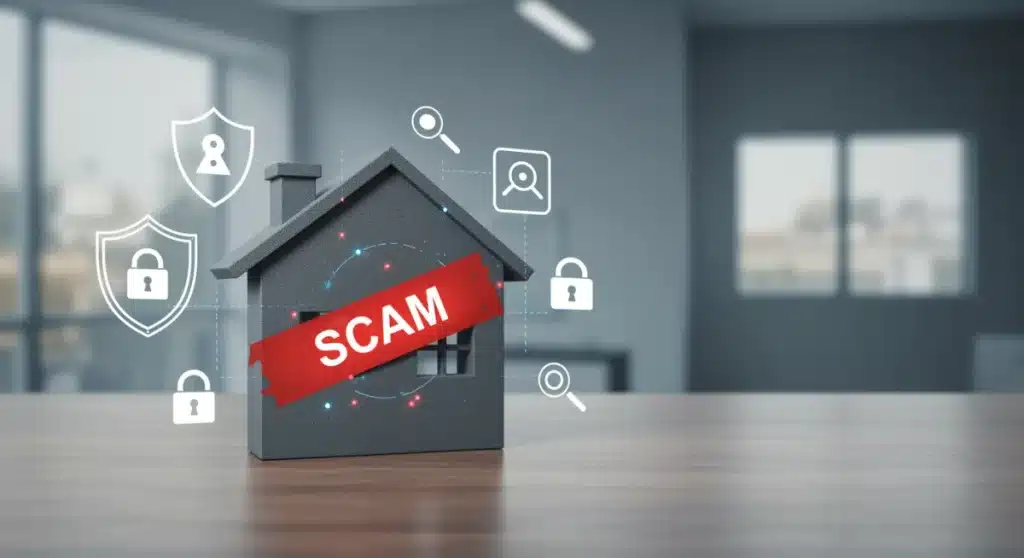Real Estate Scams 2025: Latest Consumer Alerts & Prevention

The latest consumer alerts on real estate scams in 2025 reveal evolving tactics targeting buyers, sellers, and investors, necessitating heightened vigilance and proactive protection measures to safeguard transactions and assets across the United States.
Real estate scams 2025 are rapidly adapting to new technologies and market conditions, posing significant threats to unsuspecting individuals across the United States. Staying informed about these evolving deceptive practices is crucial for anyone involved in property transactions, from first-time homebuyers to seasoned investors. This report details the most recent warnings, highlights sophisticated fraud schemes, and provides actionable advice to protect your financial interests.
Understanding the Evolving Landscape of Real Estate Scams in 2025
The real estate market, a cornerstone of wealth and stability, unfortunately, also presents fertile ground for fraudulent activities. As technology advances and transactions become increasingly digital, scammers refine their methods, making it harder for consumers to distinguish legitimate offers from deceptive ploys. The year 2025 is seeing a surge in specific types of scams, driven by sophisticated cyber tactics and a deeper understanding of market vulnerabilities.
These new scam patterns often leverage data breaches, artificial intelligence for convincing impersonations, and complex financial schemes that can be difficult to unravel. Authorities like the FBI and federal consumer protection agencies are issuing fresh warnings, emphasizing that vigilance and updated knowledge are paramount. The financial implications for victims can be devastating, ranging from loss of down payments to entire property values.
Key Trends in Real Estate Fraud
- Wire Fraud Resurgence: Despite warnings, wire fraud remains prevalent, with scammers intercepting communications to redirect funds.
- Deed Fraud Sophistication: Fraudsters are increasingly targeting vacant properties or properties with elderly owners, attempting to transfer ownership illegally.
- Rental Scams with a Twist: Scammers use advanced digital tools to create highly convincing fake listings and collect deposits.
- Foreclosure Relief Scams: Exploiting economic anxieties, these scams promise relief but often lead to further financial distress.
The shift towards remote transactions, accelerated by recent global events, has inadvertently created more opportunities for fraudsters. Digital signatures, online closings, and electronic fund transfers, while convenient, also introduce new avenues for cybercriminals to exploit. Understanding these underlying trends is the first step in building a robust defense against real estate scams in 2025.
Identifying Common Real Estate Scams Targeting Consumers
To effectively combat real estate fraud, it is essential to recognize the common types of scams that are currently circulating. These schemes often prey on urgency, lack of information, or emotional vulnerabilities, making it critical for consumers to maintain a skeptical and informed perspective throughout any property transaction. The tactics vary, but the underlying goal is always to illicitly gain money or property.
One of the most insidious forms involves impersonation, where fraudsters pretend to be legitimate agents, lenders, or even property owners. They might create fake websites, use convincing email addresses, or manipulate documents to appear authentic. Another common scam involves misrepresentation of property details, often seen in online listings where properties are advertised with misleading information or entirely fabricated images.
Spotting the Red Flags
- Unsolicited Offers: Be wary of unexpected offers to buy your property or invest in a development.
- Pressure to Act Quickly: Scammers often create a sense of urgency to bypass due diligence.
- Requests for Wire Transfers: Always verify instructions for wiring money through multiple, independent channels.
- Unusual Payment Methods: Demands for payment in gift cards, cryptocurrency, or other non-traceable forms are major red flags.
Staying alert to these warning signs can prevent significant financial loss. It’s not enough to simply be aware; active verification and cross-referencing information are crucial. Every detail, from the names on the documents to the email addresses used in communication, should be scrutinized. These common real estate scams in 2025 illustrate the need for constant vigilance and proactive defense strategies.
Protecting Your Investment: Essential Due Diligence for 2025
Effective protection against real estate scams in 2025 hinges on rigorous due diligence. This involves more than just reviewing documents; it requires a systematic approach to verifying every aspect of a transaction and the legitimacy of all parties involved. Proactive steps taken early in the process can save immense headaches and financial distress later on.
Start by independently verifying the credentials of all professionals you engage with—real estate agents, brokers, lawyers, and lenders. Check their licenses with relevant state regulatory bodies and look for independent reviews. Never rely solely on contact information provided by someone else; always seek out official contact details yourself. This fundamental step can quickly expose many common impersonation scams.
Implementing Robust Verification Protocols
When dealing with property titles and deeds, engage a reputable title company or attorney to conduct a thorough search. This is critical for uncovering any liens, encumbrances, or fraudulent transfers. For any financial transactions, especially wire transfers, always confirm instructions via a phone call to a known, verified number, not one provided in an email. Even minor discrepancies should prompt immediate investigation.
For rental agreements, physically inspect the property and ensure you meet the actual landlord or their authorized representative. Be skeptical of deals that seem too good to be true, as they often are a hallmark of rental scams. Document every interaction and keep detailed records of all communications, payments, and signed agreements. These measures form the bedrock of safeguarding your real estate investments against increasingly sophisticated fraud.
The Role of Technology in Combating Real Estate Fraud
Technology, while sometimes exploited by scammers, also offers powerful tools for prevention and detection of real estate scams in 2025. Leveraging digital solutions and understanding how they can protect you is becoming an indispensable part of real estate security. From secure communication platforms to advanced data analysis, technology provides layers of defense against fraudulent activities.
Blockchain technology, for instance, is gaining traction for its potential to create immutable records of property ownership and transactions, significantly reducing the risk of deed fraud. Secure escrow services and encrypted communication channels are also vital for protecting sensitive information and financial transfers. Many real estate platforms are integrating AI-powered tools to detect suspicious patterns in listings and communications.

Leveraging Digital Tools for Enhanced Security
- Multi-Factor Authentication (MFA): Always enable MFA on all accounts related to real estate transactions, including email and banking.
- Secure Communication Platforms: Use encrypted messaging and video conferencing for sensitive discussions.
- Digital Forensics: If you suspect fraud, digital forensic tools can help trace fraudulent communications and transactions.
- Real-Time Transaction Monitoring: Banks and financial institutions offer services that can alert you to suspicious activity on your accounts.
Staying updated on the latest cybersecurity practices and utilizing available technological safeguards can significantly reduce your exposure to risk. While no single solution is foolproof, a multi-layered approach combining human vigilance with technological tools offers the best defense against the evolving landscape of real estate scams in 2025.
Reporting Suspected Real Estate Scams and Seeking Recourse
If you suspect you’ve encountered or fallen victim to a real estate scam, immediate action is critical. Time is often of the essence in these cases, as fraudsters move quickly to disappear with stolen funds. Knowing who to contact and what steps to take can increase the chances of recovering losses and preventing further harm to others. The process can be daunting, but resources are available to help.
First, gather all documentation related to the suspected scam, including emails, text messages, financial records, and any official-looking documents. This evidence will be crucial for law enforcement and other agencies. Contact your bank or financial institution immediately if money has been transferred, as they may be able to stop or recall the transaction.
Channels for Reporting Fraud
- FBI’s Internet Crime Complaint Center (IC3): This is the primary federal agency for reporting cyber-related fraud, including wire fraud in real estate.
- State Attorney General’s Office: Your state’s attorney general can investigate consumer fraud and may offer mediation or legal assistance.
- Federal Trade Commission (FTC): The FTC collects reports of fraud and identity theft, which can help in broader investigations.
- Local Law Enforcement: Report the crime to your local police department, especially if it involves physical threats or local property issues.
It’s also advisable to contact a legal professional specializing in real estate law or consumer fraud. They can guide you through the legal process, help assess your options for recourse, and represent your interests. Reporting is not just about personal recovery; it also helps authorities track trends and issue new consumer alerts, protecting the wider community from real estate scams in 2025.
Case Studies: Learning from Recent Real Estate Scam Incidents
Examining recent real estate scam incidents provides invaluable insights into the methods employed by fraudsters and the vulnerabilities they exploit. These real-world examples serve as powerful educational tools, highlighting the importance of vigilance and adherence to security protocols. Understanding how others have been victimized can help prevent similar occurrences in the future, particularly concerning real estate scams in 2025.
One notable case involved a sophisticated wire fraud scheme where scammers infiltrated a title company’s email system. They monitored ongoing transactions and, just hours before closing, sent the buyer fraudulent wiring instructions for the down payment. The buyer, believing the email was legitimate, transferred hundreds of thousands of dollars to the scammer’s account, which was quickly drained. This incident underscored the critical need for verbal verification of all wiring instructions.

Lessons from Notable Fraud Cases
- The Impersonated Lender: A scammer posed as a mortgage lender, offering unusually low interest rates. Victims paid application fees and personal information, only to find the lender did not exist.
- The Fake Rental Property: An individual paid several months’ rent and a security deposit for a property advertised online, only to discover it was either already occupied or not available for rent by the scammer.
- Deed Theft Targeting Seniors: Elderly homeowners, often those with paid-off homes, were targeted by fraudsters who forged deeds and attempted to sell their properties without their knowledge.
These cases illustrate that scammers are adept at exploiting trust and urgency. They often use high-pressure tactics or create scenarios that seem too good to be true. Learning from these incidents reinforces the importance of independent verification, thorough due diligence, and a healthy dose of skepticism in all real estate transactions. Awareness of these past events is a strong defense against real estate scams in 2025.
Future Outlook: Anticipating New Threats in the Real Estate Market
As the real estate market continues to evolve, so too will the methods and sophistication of fraudsters. Predicting future trends in real estate scams in 2025 and beyond is crucial for staying ahead of potential threats. The increasing integration of artificial intelligence (AI), virtual reality (VR), and blockchain technology presents both opportunities for legitimate transactions and new avenues for exploitation by criminals.
AI could be used to generate even more convincing fake documents, emails, and even voice impersonations, making it harder to detect fraudulent communications. VR tours could be manipulated to misrepresent properties, creating a false sense of security for remote buyers. While blockchain offers security benefits, its complexity could also be exploited by scammers to create confusing or untraceable transactions for those unfamiliar with the technology.
Preparing for Emerging Fraud Tactics
Consumers and industry professionals must remain agile and adaptive. Continuous education on cybersecurity best practices, particularly regarding phishing and social engineering, will be more important than ever. The real estate industry will likely see a greater emphasis on standardized, secure digital transaction platforms and enhanced regulatory oversight to counter emerging threats.
Collaboration between law enforcement, technology developers, and real estate professionals will be essential to identify new scam patterns quickly and develop effective countermeasures. For individuals, maintaining a proactive stance, verifying every detail, and trusting your instincts when something feels off will remain the most powerful defense against the ever-evolving landscape of real estate scams in 2025 and beyond.
Key Alert Category |
Brief Description of Threat |
|---|---|
Wire Fraud |
Scammers intercept communication to redirect funds, often near closing. Always verify instructions via a separate, trusted channel. |
Deed Fraud |
Fraudsters illegally transfer property ownership, targeting vacant homes or vulnerable owners. Secure title insurance and monitor property records. |
Rental Scams |
Fake listings or impersonated landlords collect deposits for properties not genuinely for rent. Physically verify properties and landlord identities. |
Phishing/Impersonation |
Scammers pose as legitimate professionals to extract personal data or funds. Independently verify all contacts and unsolicited requests. |
Frequently Asked Questions About Real Estate Scams in 2025
In 2025, expect an increase in sophisticated wire fraud, deed fraud, and rental scams. Cybercriminals are leveraging AI for more convincing impersonations and exploiting digital transaction vulnerabilities, making vigilance against phishing and identity theft more critical than ever for all parties.
Always verify their license directly through your state’s real estate commission website. Do not rely on links provided by the agent. Cross-reference their contact information, office address, and any professional affiliations independently to ensure they are legitimate and in good standing.
Immediately contact your bank and the intended recipient of the funds via a previously verified phone number. Report the incident to the FBI’s Internet Crime Complaint Center (IC3) and your local law enforcement. Time is critical for fund recovery efforts, so act swiftly.
Yes, technologies like multi-factor authentication (MFA), secure encrypted communication platforms, and blockchain for immutable records can enhance security. Always enable MFA on all accounts and use trusted digital platforms for sensitive communications and financial transactions to protect your data.
Document everything, contact your financial institution immediately, and report the scam to the FBI (IC3), the Federal Trade Commission (FTC), and your state’s Attorney General. Consulting with a legal professional specializing in fraud can also provide critical guidance and help explore recourse options.
Outlook: Strengthening Defenses Against Future Fraud
The landscape of real estate scams in 2025 demands an elevated level of awareness and proactive protection from all participants. The increasing sophistication of fraudulent tactics, driven by technological advancements, means that static defenses are no longer sufficient. Moving forward, the emphasis will be on continuous education, robust verification protocols, and leveraging secure technologies. Consumers must remain vigilant, questioning unusual requests and independently verifying all critical information to safeguard their investments in an increasingly complex real estate market.





